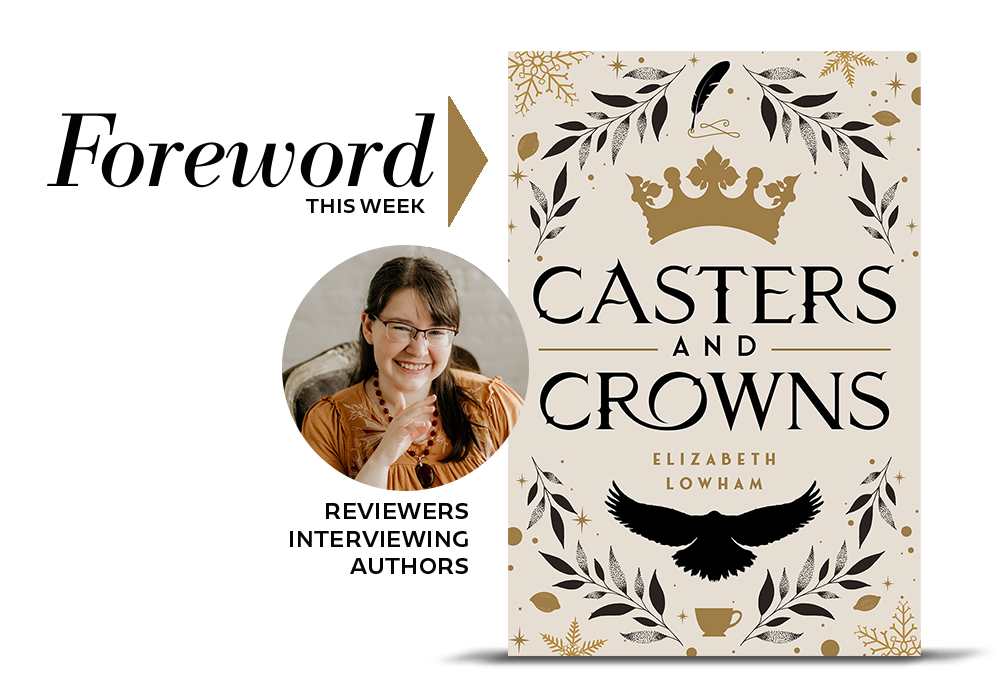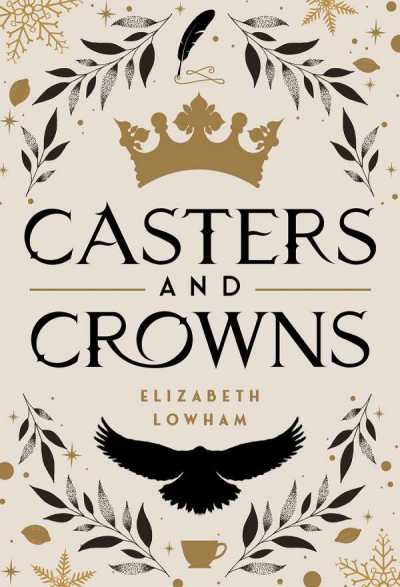Reviewer Jeana Jorgensen Interviews Elizabeth Lowham, Author of Casters and Crowns

“I love seeing how characters act in very oppressive environments—the ways they find to still be themselves, even without expansive freedom. They might say something clever, or they might just break a vase, you never know. People are often at their most creative when bound by tight rules, and that goes for both authors and characters’’. —Elizabeth Lowham
Elizabeth Lowham would have you know that fantasy novels are not just made-up flights of whimsy. In all the ways that matter, she asserts, well-written fantasies are “very, very real” and deserving of literary attention. Fantasy readers know that the popularity of the genre isn’t due to magic spells, curses, or the special powers of dragons or witches or fairies. No, fantasy novels are beloved because of relatable characters, compelling events, and provocative storylines.

Elizabeth, you should know, is also one of the best young adult fantasy writers in the business. And, on the occasion of her new Casters and Crowns earning a starred Foreword review from folklorist Jeana Jorgensen, we asked the two if they might be open to a conversation. Indeed, they would.
The Young Adult feature in our November/December issue included four other excellent titles besides Casters—find them here. Additionally, don’t forget that your free digital subscription to Foreword Reviews grants you access to reviews of the best new fantasies coming from indie publishers six times a year.
The magic system in your book seems to have more depth than many of the characters realize, with more than two types of Casters, as well as the misunderstood and demonized shapechangers called Affiliates. Otherwise, however, magic does not seem very prevalent, as in, it’s limited to these people born with certain abilities. Why did you structure the magic system like this?
I’m fascinated by the idea that people are the most important aspect of life. Circumstances change, accomplishments come and go, and at the end of the day, most of our sorrow or happiness depends on the relationships in our lives—as family members, friends, lovers, mentors, etc. Mysterious portals and fairy forests are fun, but for this story, I wanted to play with the very unsubtle idea that magic can only be found in people.
I’m a folklorist, so I love the way you played with the story of Sleeping Beauty by rearranging the motifs: a curse causing enchanted slumber, a malevolent witch-like figure, and so on. Why did you choose to work with these story elements?
Whoops? Haha. I didn’t have Sleeping Beauty in mind when I wrote this story, although I can’t be too surprised the association snuck in because my first two published novels were fairytale retellings (specifically Beauty and the Beast and a gender-swapped Rapunzel story). Actually, my first draft of Casters and Crowns was based on the 12 Dancing Princesses, until I decided during edits that I wanted to go in a different direction. So I guess the only answer would be: I love fairytales, and they fill my subconscious.
The kingdom’s system of registering and branding Casters clearly has some parallels to real-world forms of injustice. Were there any that you particularly had in mind while writing, or were there any subtle parallels you wish to expand on here?
When I started college—eighteen years old and fairly naive about the world—a relative I loved and admired displayed blatant hate speech in front of me. It was a shocking moment, and for years the experience haunted the back of my mind. Could I still love someone who hated others without even knowing them? How did someone embrace hatred based on a single attribute of someone else? Worst of all, did I have any of that same prejudice in me that I had accepted as “truth” without ever cross-examining?
I chose a brand for my Casters because I wanted something visual. Far too often, we judge other people for something we see—skin color, weight, hygiene, clothing style, etc.—rather than giving any effort to knowing the person behind the visual. I’m religious, so permit me this: Everyone is a child of God. Every person has inherent worth like yours and deep emotions like yours and core desires like yours. We all deserve to be seen for who we are, not judged for what we look like.
Grief and memory are major themes of the book, with Baron haunted by his father’s death and Aria keeping meticulous records of her mistakes and flaws. How do you think their paths to healing are similar, or might offer useful takeaways to readers struggling with related issues?
Both Aria and Baron have to learn to forgive themselves, and that’s a hard lesson for any of us. Sometimes we carry guilt for things that are not our fault, which can be a misguided struggle for control over the uncontrollable. Can we forgive ourselves for not being able to control aspects of our own lives?
Sometimes we do things that are absolutely our fault, and it matters what we do in the wake of those true mistakes. Do we try to bury them or shift the blame? Do we punish ourselves and never move forward? Or do we take responsibility, make whatever amends we can, and try to become stronger so that we don’t repeat the error? There’s a big difference between taking healthy responsibility versus drowning ourselves in guilt.
My hope for myself and readers would be exactly what Baron says: “We all get it wrong, so perhaps the answer is simply mercy. Mercy for others, and mercy for ourselves. Besides that, walking forward is an ongoing path that doesn’t end at a mistake. There’s time to mend what can be mended, to improve at the next opportunity. You’re strong enough for that.”
Much of the connection between Aria and Baron develops as they write letters to one another. Is there a reason you chose to make so much of the book epistolary in nature?
I have always been obsessed with love letters. What’s more romantic than a love letter? I think it’s because I love language so much, and when you write something down, you can take your time to choose every word, to really convey what you mean. Conversation passes in a blur. The written word is thoughtful; it can be preserved and revisited over and over. If you love someone, write it to them!
Another major theme of the book is the unchecked use of power, which Aria’s father wields when he makes proclamations about his daughters’ fate. And yet, her father eventually seems to want to do what’s right. Do you write the ending this way to show that anyone can seek redemption?
Yes, absolutely. As Mary Wollstonecraft wrote, “No man chooses evil because it is evil; he only mistakes it for happiness, the good he seeks. And the desire of rectifying these mistakes is the noble ambition of an enlightened understanding.”
From the start, I wanted Aria’s father to be painfully human. He carries great responsibilities, and he often has to make quick decisions that influence the lives of other people, even life-or-death decisions. Truthfully, I don’t envy a monarch. But I think for someone in any position of power over others (politician, boss, coach, king), the worst mistake they can make is a lack of honest self-reflection. We all make mistakes, and we all come to crossroads where we’re forced to confront them. I believe anyone can seek redemption. The question is, in our crossroads, will we? Or will we retreat into denials and justifications?
When faced with what we’ve done wrong, I hope we can all choose the “noble ambition” of rectifying rather than retreating, even when the pain and cost of change is severe. I know many readers hate Aria’s father, but I don’t. I love him. I wish he would have made vastly different decisions earlier on, but I’m proud of the difficult decision he made in the end. (It is a very strange thing to be an author sometimes, inventing people and then being agonized over them.)
The mix of manners and magic makes for an enticing fantasy adventure, set half at court where characters must navigate lots of etiquette, and half on the road where characters are free to be themselves. Which type of scene is more fun for you to write, heavily polite and restricted or more free-wheeling, and why?
Oh, heavily restricted, definitely. I get overwhelmed by possibilities when anything can happen, haha. Beyond that, I love seeing how characters act in very oppressive environments—the ways they find to still be themselves, even without expansive freedom. They might say something clever, or they might just break a vase, you never know. People are often at their most creative when bound by tight rules, and that goes for both authors and characters.
Jeana Jorgensen
